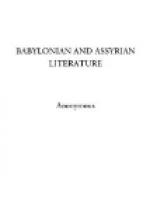“Have I embraced a god?”
He horrified now cries; and she doth nod
Assent.
“But, oh! wilt thou thy queen forgive?
I love thee! stay! oh, stay! my heart you grieve!”
He springs beyond the mystic circling ring,
And from their sight thus glides the angry King,
Beneath the wood himself he doth disguise
In tattered garments, on his steed he flies;
And when he comes in sight of Erech’s gate,
His beggar’s mantle throws aside; in state
Again enrobed, composed his anxious face,
Through Erech’s gates he rides with kingly grace;
O’er his adventure thus the King reflects:
“Alas my folly leads, my life directs!
’Tis true, the goddess hath seductive charms,
E’en yet I feel her warm embracing arms.
Enough! her love from me I’ll drive away;
Alas! for me, is this unfruitful day!”
[Footnote 1: “Hea,” god of the ocean.]
[Footnote 2: “Zir-ri,” spirits of the river, the sea-daughters of Hea.]
[Footnote 3: “Zir-ru,” water-nymph.]
[Footnote 4: “Mandrake,” the “love-plant.”]
[Footnote 5: “Dud’im” or “dudaim,” [Hebrew: dud’im] or Chald. [Hebrew: ibduchin] and Syr. [Hebrew: ibduch’] the “love-plant” or mandrake; perhaps also originally from “du-du” ("love”) or ex. [Hebrew: du] ("particula"), Arab. “possessorem designante,” et ex rad. Arab. [Hebrew: ddy] ("aegrotavit"), or [Hebrew: dud] or “amare.” See Simoni’s Lex. Man. Heb. et Chald. et Lat., pp. 204-206, and Park’s Heb. Lex., p. 113, note +.]
[Transcriber’s Note: The above “+” is my rendering of a footnote “cross” common in older books.]
[Footnote 6: “An-nu-na-ci,” spirits of the earth.]
TABLET II—COLUMN I
ISHTAR’S MIDNIGHT COURTSHIP IN THE PALACE OF IZDUBAR.
As Samas’ car sank in the glowing west,
And Sin the moon-god forth had come full drest
For starry dance across the glistening skies,
The sound of work for man on earth now dies,
And all betake themselves to sweet repose.
The silver light of Sin above bright flows,
And floods the figures on the painted walls,
O’er sculptured lions, softly, lightly falls;
Like grim and silent watch-dogs at the door
They stand; in marble check their leaping roar.
The King within his chamber went his way,
Upon his golden jewelled couch he lay.
The silken scarlet canopy was hung
In graceful drapery and loosely clung
Around his couch, and purple damask cloths
Embroidered with rare skill, preserved from moths
By rich perfumes, to the carved lintel clung
In graceful folds; thus o’er the entrance hung.
Queen Ishtar softly comes, and o’er his dreams
A mystic spell she draws, until it seems
While half awake he lies, that she is yet
Close nestling in his arms, as he had met
Her in the wood, and with her there reclined,
While her soft arms around him were entwined.
Thus while he sleeps she hovers o’er his bed
With throbbing heart, and close inclines her head
Until her lips near touch the sleeping King’s,
But daring not to kiss.




